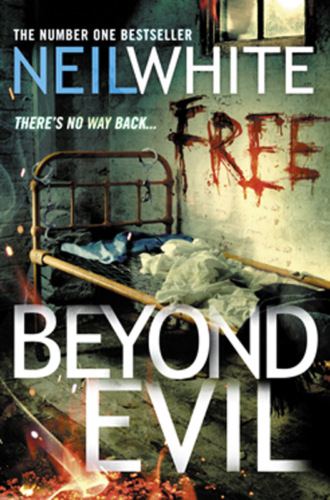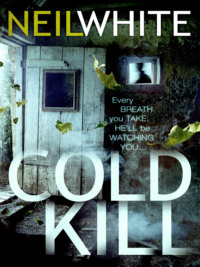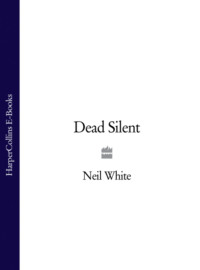
Полная версия
BEYOND EVIL
Sheldon stopped at the doorway of the Incident Room and looked in. The station wasn’t used to so much activity, and the squad looked crammed in. Condensation was building up on the windows and officers lined the walls, the few available chairs taken by the keen ones who had arrived first. He recognised all the detectives in there, testament to the twenty-five years he had put in, the eager young cadet turned into a jowly man in his fifties. As people saw him, the sounds of conversation died away, and they exchanged glances, some of disappointment, some of surprise.
Sheldon smiled, but it came out like a twitch, and then he walked in, his head up. All the eyes in the room followed him as he took a place at the front. The only sound in the room was the rustle of an envelope as he pulled out a set of photographs, and then the rip of sticky tape as he pasted them to the whiteboard at the front of the room. They were the pictures from the night before, the body on the hotel bed, strapped to the corners, the face sliced off.
Murmurs went around the room as they took in the images. Sheldon guessed that word of the body had gone round the station, but photographs made things more real.
Sheldon cleared his throat and then turned round to look at the squad. His hands went into fists again. ‘Last night was grim,’ he said. ‘I was there. I know how it was. We need to catch whoever did this.’ He tried to make it sound like a rallying call, but he was met by stares and silence. His tongue flicked across his bottom lip, waiting for someone to ask a question, just to fill the gap.
‘Do we know who the victim is yet?’ a voice said at the back. Sheldon recognised him. Duncan Lowther, the poster boy for the local CID. He was a hobby copper, inherited wealth funding his life, not the job. His was the Porsche on the car park, to match the expensive cologne, and the weekends spent in the wine bars of Manchester. He talked of great literature and art-house cinema, and didn’t wear the usual uniform of pastel shirts and chain store suits, preferring tight grey V-necks and silk ties.
Sheldon had seen too many coppers like him. All glory, no graft.
‘That’s the first thing we need to work out,’ Sheldon said. ‘Always start with the victim. And someone needs to go through the incident logs for the county for the last twelve hours, just to check if someone didn’t come home.’
‘Extra-marital?’ someone else said. ‘Maybe a jealous husband?’
Sheldon nodded. ‘Maybe. That is one angle. It was cruel, and so revenge seems a motive.’ He looked at the photographs again. ‘The face was removed and wasn’t left in the hotel room. We need to find where it went, because someone took it away for a reason, and so we need to know why.’
‘It could just be a random sick murder,’ Lowther said. ‘These things do happen. And does it matter why? It’s the who that’s important.’
Sheldon felt the smile grow on his face, although it felt tight and unnatural, and he knew it hadn’t reached his eyes. ‘Thank you for your wisdom, but if you get the why, you’ve got yourself a suspect list. And you’ve just got yourself the CCTV job.’ When Lowther looked confused, he added, ‘Go to the hotel and watch the camera footage. Account for everyone staying there. If someone comes in who you can’t put in a room, there’s your first suspect. Then go through the town cameras. Someone running, or a car going too fast.’ He looked around the rest of the room. ‘The rest of you. Divide yourself up into twos. It’s time to knock on doors. You know the routines. Get the paperwork in, look for the unusual, and let’s hope for a forensic hit.’
‘How long have we got the job in Oulton?’ a voice said at the back. ‘FMIT are coming over.’
‘I want to keep it with us,’ Sheldon said. ‘The people in this town know us and trust us. You know how it is around here, that they don’t like outsiders. If we let FMIT take over, people might clam up and we will lose that local contact.’
There were some murmurs of agreement, before everyone looked to the front, startled, as a uniformed officer burst into the room. He looked at the photographs, and then at Sheldon.
‘Yes?’ Sheldon said, irritated.
‘We’ve just had a call, sir, from the paper, the Lancashire Express,’ and he pointed to the photographs taped up at the front. ‘It’s about your case. They said they’ve got something you have to see.’
Chapter Four
Charlie walked to his office, as usual. Even though there had been a burglary, getting there earlier would only make a bad start come sooner.
The stroll shook off most of the booze from the night before, although he couldn’t get over the slump as quickly as he could a few years earlier. Managing a hangover was just about patience though, and so he knew he would be over the worst by lunchtime.
His apartment was at the top of the town, just so that they could sell it by the views. It wasn’t a long walk; just past the entrance to a council estate, where the street signs were obscured by graffiti, and then along a row of terraced cottages whose views across barren hills had been stolen by the march of progress.
As he walked past the Eagleton, the best greasy spoon in town, with large windows that were permanently steamed up, he heard someone ride alongside him on a bike, the tyres crunching on the small stones in the gutter. Charlie’s pupils were still sluggish, but he recognised him as Tony, one of his regulars. This was the part of the day when Tony made sense, before he stocked up on bargain vodka and watched the day dissolve into a blur of survival, every day just an attempt to get through to the next one. Sometimes he got into fights, just messy brawls most of the time, and that’s when he turned up at Charlie’s office.
‘Tony. How are you doing?’
‘Have you seen up by the Grange?’ he said, pointing over his shoulder, towards the moors. ‘There’s police everywhere.’
‘There’s been a murder,’ Charlie said. ‘It’s probably to do with that.’
‘Who is it?’
Charlie shrugged. ‘I don’t know.’
‘It must be someone important. I’ve never seen so many police.’
Charlie smiled. ‘We’re all important, Tony, even you.’
He was about to set off walking again when Tony said, ‘I’ve just had a summons, for threatening behaviour. I’m up next Thursday. I was on my way to your office.’
‘You won’t get legal aid.’
Tony scowled.
Charlie stopped walking and sighed. He knew the scowl. If Charlie wouldn’t do it for the goodwill, then someone else would. He remembered refusing to turn out for someone on a freebie, and the client killed someone two months later. The one who did the freebie got the murder.
‘Guilty plea?’ Charlie said.
Tony nodded.
‘Okay, I’ll see you there, but if something else comes up, you’re on your own. I’m yours if I’m available.’
Tony smiled. ‘Thanks Charlie.’
Charlie didn’t say anything as Tony set off riding again. People like Tony kept the work flowing. Sometimes he got paid, and sometimes he didn’t, but Charlie had to look after him for those days when he did, because he had chosen criminal law, the budget end of the trade. He remembered the brochures for high-earning corporate firms that littered the career racks at his university, attracting those with polished accents. The only child from his family to go to university, Charlie guessed at his limitations and aimed low. At least he achieved his aim, and it didn’t seem like failure.
As Tony rode away down the hill, Charlie noticed a group of people on the other side of the street. Six of them, all in black clothes, and Charlie thought they were looking straight at him. They were near the office, and even as Tony went past them, they didn’t change their focus.
That made him pause. For every client he had to defend, it usually meant upsetting someone else, like a victim or a police officer. Charlie paused for a moment, made some pretence about checking his phone, but when he looked up again, the group were no longer there.
Charlie frowned. Perhaps he had misread it. He shrugged and set off walking the last hundred yards to his office, above a kebab shop and accessed by a door squeezed between it and a tattoo parlour.
Charlie had set up his own practice five years earlier, when the firm he trained with started to replace the lawyers with paralegals. He had known that he was next in line, and so he went on his own. The dream of building an empire soon soured, with long hours just to make the practice break even, with too much time spent on practice management, just to prove that he was fit to do legal aid work. He had been on the brink of walking away from it all, knowing that he wasn’t cut out for it and that a job behind a bar might make him happier, when Amelia had approached him and said that she wanted to buy in.
Amelia Diaz. He had seen her a few times around court before then, and her appearance was hard to forget, with long dark hair and an olive-tanned cleavage that she flaunted at men to get what she wanted, and at women just to show that she had it. Her father was from Barcelona and had married an Englishwoman, except a northern upbringing had given her more brashness than Catalan swagger. Charlie hadn’t wanted a partner, but he was too desperate to turn her away, because it let him carry on being the only thing he knew he was good at – a Magistrates Court legal hack.
As he climbed the stairs, he could hear the coffee machine bubbling.
‘Amelia?’
She popped her head around the door of her office and scowled. ‘Glad you could make it. Come in.’
Charlie rolled his eyes at Linda, who had been his receptionist and secretary and office manager since he started, a woman with the stature of a bowling ball, with hair cropped close to her head.
He grabbed a coffee from the machine before going into Amelia’s room. There was someone else in reception, a skinny teenager, late teens, in a blue skirt and jacket. Mixed race, her teeth white as she smiled, bright against her caramel skin and the loose frizz of her hair. Charlie raised a hand in greeting and fought the urge to smooth down his hair. Then he caught his reflection in a picture frame, grey streaks and messy whiskers, and looked away. He was a generation too old, and he wore every year of it.
Amelia’s office was minimalist, with a coat of white paint and a glass desk in one corner. The carpet had been taken away and the floorboards stripped and stained white to match the walls, the old curtains replaced with modern office blinds. A computer hummed on the corner of the desk.
Except that it wasn’t in its usual tidy state. There were files strewn on the floor.
‘How did they get in?’ Charlie said.
‘They smashed the glass in the fire escape and climbed in through there.’
‘What about the alarm?’
‘It needs fixing, you know that.’
Charlie leant against the doorframe. ‘Did they take anything?’
‘I don’t think so,’ Amelia said. ‘It was more like a search. The monitors are still here. Even the petty cash tin and the television.’
Charlie frowned. ‘That worries me more,’ he said. ‘If they wanted something from the files, one of our clients might be in danger, if it’s important enough for a break-in. Have you called the police?’
Amelia thought about that and then shook her head. ‘If they want something from the files, the police will want to know what we think it is, and I’m not breaching a client’s confidence.’
He knew she was right. He represented burglars. He couldn’t get too worked up about one of them coming to visit.
‘Leave it, Charlie, I’ll sort it out,’ she said. ‘These are your files for court,’ and she handed over two blue folders.
‘And what did you say you were doing?’ he said.
She looked at him for a moment, as if she was about to tell him something, but then she sighed. ‘Sorting this out, and then some admin stuff; you know, like keeping the accounts up to date, and some bills. And I’ve got a private payer coming in to see me.’
He waved it away. ‘You can keep that one,’ he said. ‘They expect too much for their money.’
‘You should learn to love them, because they pay three times more than legal aid, and they won’t go through your handbag when they’re alone in the room.’
Charlie didn’t need Amelia’s take on the business. He had been doing the job longer than she had, and all Amelia could offer was something that he knew already but just didn’t want to hear.
He watched her as she sat at the desk. Charlie thought she seemed distracted, her scowls interrupted by the occasional faraway gaze.
‘You all right?’ he said.
She looked up at him, and Charlie saw vulnerability. It didn’t surface often with Amelia. A couple of times after too much booze, and when they’d talked money. Or the lack of it. Amelia was business-like, brisk, and could even be fun, when the wine flowed and the music was right. But today her eyes seemed a little wider than usual, more searching. It was just for a moment though. She shook her head, and then smiled. ‘I’m fine,’ she said.
‘Who’s the girl in reception?’
‘Donia. She wants some work experience, is about to go away to university. I thought you could show her round the court.’
Charlie rolled his eyes. Great. Now he had to babysit someone all day. This was Amelia’s idea of making business pay, getting students to work for nothing, all of them hopeful of some job opportunity that would never materialise.
‘She’s come a long way, from Leeds,’ Amelia whispered, her door open. ‘Even rented somewhere for the week. Be nice to her.’
He walked away and went to his own room. As he went past Donia, she looked up again, as if she expected him to stop, but he didn’t. There was no point in getting friendly. If she hoped for a training contract, she would be disappointed.
As Charlie went into his room, he was surprised. It was untidy, but that’s how he had left it. He put his head back out of the door. ‘Why just your room?’ he shouted towards Amelia.
‘You can ask them if we ever find out who did it.’
Charlie shrugged and closed his door. He threw his files onto the desk, before he let his feet join them as he slumped into his chair, an old burgundy recliner with coffee stains on the arms.
Charlie’s room was at the front of the building, because it came with a view of the street. It wasn’t much, just the curve of a cobbled street, but it gave him something to look at. It was the comfort to Amelia’s austere. The desk was old and scarred and faced the window, so that the sun had bleached out the varnish. There were some dirty coffee cups that had never made it back to the kitchen and a pile of files that needed work.
Amelia hated the premises, but Charlie refused to move.
So this was it, he thought, as he stared out of the window. The week was about to start. Just another grind through routine court cases. The week will end, and then it will be the same again. A lost weekend, and then Sunday spent wondering what he had said the night before. He watched an old woman walk up the hill, her back bent, as if she had spent most of her life walking up hills that were too steep to live on. That’s how it seemed in Oulton. Too steep, too cold, too isolated. The town didn’t grow or reinvent itself. It just crumbled a slow death, every closure bringing more boarded-up windows, and one more reason for people to head down into the valley and not come back.
As he looked out, he saw something further along the street.
There was the same group of young people he had seen outside the café, all around twenty years old, all in black, their hair long and dyed black to match, their faces pale. There were glints of metal in their faces. One of them had a guitar. He looked older than the rest, with wild dark hair and lighter clothes. Dirty denim rather than black. The others seemed to encircle him as they walked, and most seemed to be smiling.
They must have seen Charlie staring, because they glanced up as they passed below his window. The older one nodded, and Charlie thought he saw him smile.
Chapter Five
John Abbott squinted as he opened his eyes. It wasn’t a bright day, he could tell that from the greyness on the other side of the glass, and there were no curtains or blinds at the window. It was later than the usual waking time, because they woke with nature, but the night before had been a late one.
He waited a few seconds for his eyes to adjust, and then looked towards the window again. There were other people moving elsewhere in the house, but he wasn’t ready to get up.
He felt Gemma stir against him, her skin warm, her arm across his chest. His thoughts went back to the night before and he grimaced. It wasn’t supposed to happen like that. She’d been more excitable than normal and had chosen him again. He could have said no, that it wasn’t right, made up some excuse, but he didn’t. He gave in every time. It was the way she smiled at him, cute, coy, with large appealing eyes, and how she covered her mouth when she giggled.
It was more than just her appeal though. He had needed the warmth and the closeness, although in the harsh light of morning he knew he shouldn’t have done it.
Her leg moved across him and he pushed it away. The noises were getting louder in the house, and so he knew he had to get up. He moved her arm and slid out of bed, although that was a generous description for a mattress on the floor covered in blankets. Only a rug stopped his feet from hitting the cold wooden floor. He looked down. The covers had slipped from her. He shook his head. Gemma was too young, her shoulders thin and bony, her skin pale and mottled. Her face was too innocent for what had happened the night before, her nose small and dappled by freckles, wisps of mousy hair across her cheeks.
He padded over to the window and looked out. He was naked, but it didn’t seem to matter whether anyone could see him outside. The view calmed him. They were on the top of a long slope, with mist in the deep valley below, just bracken and gorse for the most part, but clusters of trees broke up the hills and sheep dotted the slope on the other side. John liked the isolation, the countryside the same as it had been for hundreds of years, the chimneys and terraced streets in a different valley he couldn’t see. He looked down at the Seven Sisters, remnants of a stone circle in the field in front of the cottage, just seven stone fingers rising out of the ground in a grey crescent.
They were in an old stone farmhouse, where everyone slept in cramped quarters, five to a room. The room he was in with Gemma was the exception, the party room, apart from Henry’s room, where he slept alone. The farmhouse owner slept in a room downstairs. John didn’t like to think of that, because he was neglected, too infirm to look after himself.
There was a noise behind him. He turned round. Gemma was sitting up, smiling. He went as if to cover himself, but she laughed.
‘Too late to be embarrassed now,’ she said, her voice light and soft. ‘Nothing is wrong that is beautiful, you know that. Henry said that.’
‘I know that, but, well,’ and he shrugged.
She reached over to the side of the bed and rummaged in a bag. She pulled out a spliff and lit the paper twist at its tip. That warm, cloying smell of cannabis drifted towards him. She took a hard pull and held it in, before letting it out with a cough and a smile. The first one of the day was always the worst. She leaned forward to offer it to him. ‘You’re free, babe. Leave your hang-ups behind.’
He was reluctant, but she thrust it again and said, ‘Come on, it’s okay.’
John went to her to take it from her and rolled it between his fingers, watching as the glowing tip turned soot-grey. He took a small drag and then hacked out a cough when he took in the smoke.
She laughed. ‘I thought you were getting used to it,’ she said, and then flopped back onto the bed.
‘How old are you?’ John asked, his eyes watering from his coughs.
Gemma wagged a finger. ‘I’ve told you before, details spoil a good time.’
‘It’s important though.’
‘But why?’
‘Because of what we did last night.’
‘You’ve so much to learn,’ she said, shaking her head, smiling. ‘You’re not bound by the old rules anymore. Freedom. Remember that word, John. It’s the whole point of us. Don’t you listen to Henry? The law is just what society says we cannot do, but we are not part of that society anymore. We are our own selves, free people, living human beings.’ She turned over and propped herself on her elbows, her chin in her hands. ‘Didn’t you enjoy it?’
John looked at the naked stretch of her body. Her smooth back, her pert backside, and his mind went back to the night before. ‘Yes, I enjoyed it,’ he said, and a flush crept up his cheeks.
She giggled. ‘I can tell,’ she said, looking at his groin.
He took another drag on the spliff and then bent down to pass it back to her. She smiled as she took it, her features lost in a pall of sweet smoke, and there it was again, that disquiet that there was something too childlike about her.
As Gemma took a hard pull, John asked, ‘Where did Henry go last night?’
There was a pause as she held the smoke in her lungs. She smiled as she let it out again, and then said, ‘Why?’
‘Henry went out again, and he goes out a lot. I’m confused, that’s all. He wants me to give everything up for him, for the group, but does he give everything up for me?’
Gemma sat up, her face more serious now. ‘You know things are happening. He has to arrange things, and so he has to meet people.’
‘But he could phone, or email or something.’
‘Haven’t you noticed yet, that we have nothing like that? They can trace where you are and intercept what you are saying. He told you that. Didn’t you understand?’
‘Of course I did. I just thought there must be a better way to organise things.’
Gemma frowned. ‘You ask a lot of questions.’
John paused before he answered. ‘Just curious, that’s all.’
Gemma looked at him, her head cocked, serious for a moment, and then she asked, ‘So how old are you? Thirty?’
‘Twenty-five,’ he said. ‘I’ve got an old face, that’s all.’
‘I like your face,’ she said, her voice softer. ‘Come here.’
He shook his head. ‘I don’t think we should. I can hear people moving around.’
‘Henry told me to make you happy,’ she said, and then she giggled, her hand over her mouth. ‘I can see that you are happy.’ Gemma parted her legs. Her hips were bony and thin.
John closed his eyes for a moment and tried not to think of how she had been.
‘Is Henry always going to approve everything?’ he said, and opened his eyes again. ‘How can we be free if we need Henry’s approval?’
‘Are you questioning Henry?’
John shook his head. ‘I wouldn’t do that, you know that.’
‘We have to fight for our freedom,’ Gemma said. ‘You do believe that, don’t you? We are building for something big that will make everyone take notice, and if you don’t believe that, well, there’s no point.’
John nodded, and took a deep breath. ‘I believe in us, you know that.’
‘So come back to bed, because if Henry decides that this shouldn’t happen anymore, it will stop, and I don’t want that, because I want to please you. And you want to please Henry, don’t you?’
He nodded. ‘Yes, I want to please Henry.’ His voice sounded weak.
John went to the bed again. Gemma’s arms went around his neck and he felt her body begin to press against his. He closed his eyes as his resolve weakened, as she guided him towards her.
Chapter Six
Sheldon’s heartbeat was drumming fast again as he skipped up the stone steps to the Lancashire Express offices. Tracey Peters was behind him, walking with a crime scene investigator. There was a uniformed officer in a fluorescent green jacket by the corner of the building, someone’s arm around her. Further along, on a low stone wall, there were people gathered in a huddle.






